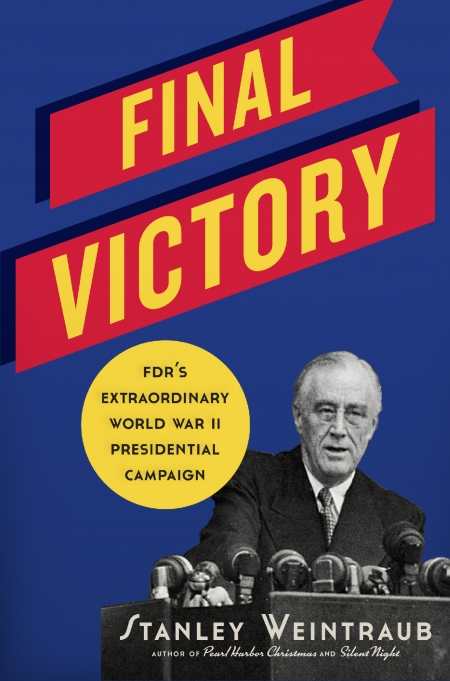Final Victory
FDR's Extraordinary World War II Presidential Campaign
A dying president, an untested second-in-command, a brash and self-righteous challenger—Stanley Weintraub’s Final Victory: FDR’s Extraordinary World War II Presidential Campaign comes front-loaded with enough dramatic material for a multivolume historical series. That he manages to tell his story in a compact 256 pages is an impressive feat.
Its publication coinciding with the 2012 presidential campaign season, Weintraub’s saga about the little-known but tempestuous election of 1944 makes for riveting reading. Against a backdrop of world war and fluctuating domestic economic conditions, Franklin Delano Roosevelt campaigned for an unprecedented fourth term as president while in the throes of rapidly deteriorating physical health. The truth was—though few in the public knew it—the ordeal of running the country and overseeing a vast military enterprise had brought FDR to the brink of death numerous times. “However downplayed, polio had long immobilized his legs. Although his muscular upper body was all most onlookers saw, the president was more helpless, physically, than the public realized.” When the time came to select a running mate, Democratic Party kingpins understood, without ever saying it out loud, that the vice-presidential candidate (who turned out to be a little-known senator from Missouri named Harry Truman) would likely assume the leadership role before Roosevelt’s fourth term ended, which is of course how events played out. FDR never gave a thought to withdrawing from the race: “He was more concerned about losing than about dying.”
In addition to the inherent drama of a presidential campaign during wartime, Weintraub has several larger-than-life personalities to throw into the mix, among them General Douglas MacArthur. A presidential hopeful himself (“he saw himself as the distant yet popular rescuer of the Republican Party from three terms of Rooseveltian attrition”), MacArthur was a difficult man for FDR to control and yet another sap on his dwindling reserves of energy. Weintraub deftly portrays Roosevelt’s maneuvering of this charismatic and maddening military genius; the president never let MacArthur forget who was ultimately the commander.
A particularly striking sub-plot of Final Victory is the burgeoning public relations machinery that emerged around FDR and his health issues. What we now know as “spin” came into maturity with efforts to conceal his true condition from the voting public. Medical findings were kept hidden, press photographs carefully selected to portray only a vibrant FDR, and Truman, when pressed by reporters, described the sickly commander-in-chief as “keen as a briar.” At campaign stops, the immense portraits of FDR on display were routinely taken many years earlier. Secrets about the President were kept from the electorate in ways unimaginable in our own tell-all times.
Readers drawn to compelling stories about American politics will find Final Victory a rewarding and highly informative book.
Reviewed by
Lee Polevoi
Disclosure: This article is not an endorsement, but a review. The publisher of this book provided free copies of the book to have their book reviewed by a professional reviewer. No fee was paid by the publisher for this review. Foreword Reviews only recommends books that we love. Foreword Magazine, Inc. is disclosing this in accordance with the Federal Trade Commission’s 16 CFR, Part 255.

